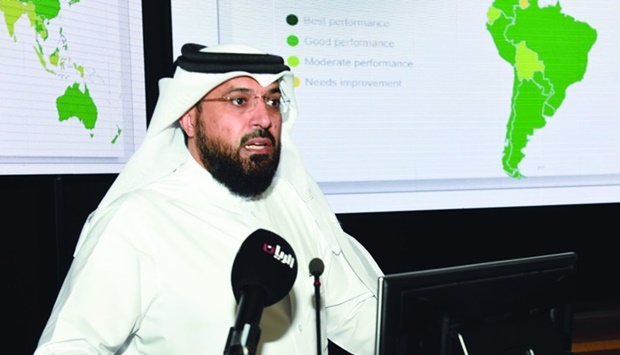Qatar ranked first among Arab countries and 24th globally in the 2021 Global Food Security Index (GFSI) according to the report issued by the Economist Intelligence Research Unit. During a press conference held Wednesday, Director of the Food Security Department at the Ministry of Municipality Dr Masoud Jarallah al-Marri said that Qatar jumped 13 places to 24th out of 113 countries in 2021 after it was ranked 37th in 2020.
He pointed out that Qatar has invested heavily in food and agricultural policies, infrastructure, market updates, ports and storage reserves.
It has also increased interest in food security research and established a fund to sponsor agricultural and food research, in addition to developing the national strategy for nutrition, including guidelines, standards, labels and posters for nutrition, while providing healthy food and nutrients from minerals and vitamins, as well as intensifying efforts to adapt to climate change and preserve land, water and marine resources.
Dr al-Marri emphasised the availability of food for all residents of Qatar, which is one of the most distinguished countries in terms of spending and funding for research and development in the field of agriculture, as well as investing in crop storage, improving roads, ports, and irrigation infrastructure, diversifying partners in international trade and trade routes, and increase in local production capacity of the most important basic commodities, including milk and dairy products, poultry, fresh vegetables and seafood.
He explained that Qatar has significantly developed food markets and agricultural yards, expanded and modernised the logistical infrastructure in ports and warehouses, and established strategic storage reserves of wheat and rice, increasing the reserve stocks of a wide range of basic foodstuffs in retail stores, while increasing public expenditures on agricultural research through the Qatar National Research Fund for food security.
Dr al-Marri said that the Ministry of Municipality, in co-operation and co-ordination with the authorities concerned, is keen to continuously improve the state of food security for Qatar and the increasing classifications in the following versions in the GFSI. This includes reducing food loss and waste in the supply chain, improving production capacity and encouraging production throughout the year to deal with the critical summer months, adopting production methods that are compatible with the environment, achieving global best practices in food safety and quality standards, improving market access and financing local producers to improve the economic viability and attractiveness of local food production and food processing in Qatar.
He pointed out that despite the climate and natural resource challenges that Qatar faces, it always seeks to improve its food and agricultural conditions by relying on research, innovation, modern technology and making good use of available resources.
He pointed out that Qatar has invested heavily in food and agricultural policies, infrastructure, market updates, ports and storage reserves.
It has also increased interest in food security research and established a fund to sponsor agricultural and food research, in addition to developing the national strategy for nutrition, including guidelines, standards, labels and posters for nutrition, while providing healthy food and nutrients from minerals and vitamins, as well as intensifying efforts to adapt to climate change and preserve land, water and marine resources.
Dr al-Marri emphasised the availability of food for all residents of Qatar, which is one of the most distinguished countries in terms of spending and funding for research and development in the field of agriculture, as well as investing in crop storage, improving roads, ports, and irrigation infrastructure, diversifying partners in international trade and trade routes, and increase in local production capacity of the most important basic commodities, including milk and dairy products, poultry, fresh vegetables and seafood.
He explained that Qatar has significantly developed food markets and agricultural yards, expanded and modernised the logistical infrastructure in ports and warehouses, and established strategic storage reserves of wheat and rice, increasing the reserve stocks of a wide range of basic foodstuffs in retail stores, while increasing public expenditures on agricultural research through the Qatar National Research Fund for food security.
Dr al-Marri said that the Ministry of Municipality, in co-operation and co-ordination with the authorities concerned, is keen to continuously improve the state of food security for Qatar and the increasing classifications in the following versions in the GFSI. This includes reducing food loss and waste in the supply chain, improving production capacity and encouraging production throughout the year to deal with the critical summer months, adopting production methods that are compatible with the environment, achieving global best practices in food safety and quality standards, improving market access and financing local producers to improve the economic viability and attractiveness of local food production and food processing in Qatar.
He pointed out that despite the climate and natural resource challenges that Qatar faces, it always seeks to improve its food and agricultural conditions by relying on research, innovation, modern technology and making good use of available resources.

